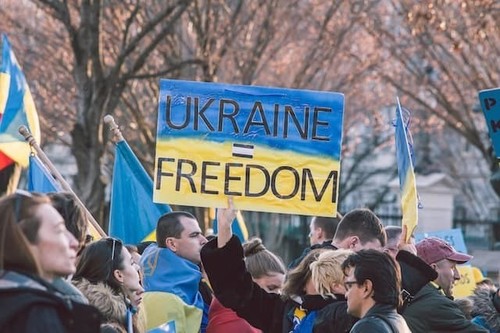Ukrainian And Russian: How Similar Are the Two Languages?

Reviewing the history and linguistic peculiarities, one can easily say that the myth that Ukrainian and Russian are the same languages is just a myth. It is hard to locate one specific place of the language’s origin but according to George Shevelov, Kyiv and Halych contributed the most to the formation of the Ukrainian language. Both Ukrainian and Russian languages are derived from the Proto-Slavic language which seized to exist approximately in the 9th century. Both languages belong to the same East Slavic group along with Belarusian. Does it make them so closely related as some linguists say?
Not as Close as You Might Think
While Belarusian is indeed really close to Ukrainian with its 84% similarity, so people can understand each other almost completely, the similarity level between Ukrainian and Russian is only 62%. Polish, which belongs to West Slavic languages is in fact closer to Ukrainian – 70% similarity. Then why do Ukrainian and Russian are so closely associated?
The answer basically lies in the history of two countries – the history of Russian aggression and the occupation of Ukrainian lands. For decades the use of the Russian language was obligatory in education and administrative spheres. As the result, the majority of Ukrainians are bilingual and they do not think too much about the differences between the two languages. They just use both of them and usually switch without many difficulties. Let’s get acquainted with some details about the differences that a foreigner might notice:
Grammar
Overall, the structure, principles, and categories are mostly similar in both languages. The same applies to sentence organization. This means Ukrainians usually have to focus on vocabulary and different terms while studying Russian since they already know the basics of grammar.
The peculiar case system is a feature that is characteristic of both languages. Nominative, accusative, and instrumental cases are used similarly which can be illustrated by the example below:
- Ukrainian:
Я бачу друга (The word “друг” (“friend”) is in the accusative case)
Друг бачить мене (Now this word is in the nominative case)
Я розмовляю з другом (And now it is in the instrumental case)
- Russian:
Я вижу друга
Друг видит меня
Я говорю с другом
- English:
I see the friend
The friend sees me
I speak with the friend
At the same time, Ukrainian has 7 cases while Russian has only 6. The additional case is called vocative. The same word “друг” (friend) will be changed to “друже” in Ukrainian and remain “друг” in Russian.
Vocabulary
Studies show that the difference in vocabulary between Ukrainian and Russian is close to 40%. Both languages had different ways of incorporating foreign words. There is a variety of regional dialects that influenced each of these two languages and added local flavor to literary variants. As the result, Russians will have a hard time trying to understand a person from the Western regions of Ukraine. Let’s demonstrate just some examples that show the differences:
|
Ukrainian |
Russian |
English |
|
Полуниця
Око
Ранок
Людина
Дорослий
Віслюк
Час
Сорочка
Питання |
Клубника
Глаз
Утро
Человек
Взрослый
Осёл
Время
Рубашка
Вопрос |
Strawberry
Eye
Morning
Person
Adult
Donkey
Time
Shirt
Question |
These are some words that are completely different and presented without context. The ways of naming certain things such as months are often completely different. Russians adopted words from Latin (май, апрель, октябрь) while Ukrainians used their own traditions and nature’s state at a certain time (жовтень, листопад, лютий).
The substantial differences in vocabulary prove the fact that both languages had their own ways of development. And even though they have one common source, Russian propaganda that tries to diminish the Ukrainian language is completely wrong. One shouldn’t be a linguist to see the fact that there is no sign of Ukrainian being less important and developed than Russian and all those claims have political nature.
Letters and Sounds
Even though both languages use the Cyrillic alphabet, there are some letters in Ukrainian that are not present in Russian (ґ, є, і, ї) and vice versa (ё, ъ, ы, э).
Pronunciation peculiarities allow distinguishing Russian and Ukrainian people quite easily. For example, Ukrainians have a specific sound /ɦ/ (glottal fricative) and they use it instead of Russian /g/. So, the word “гуси” would sound different in Russian /gusi/ and Ukrainian /ɦusɪ/.
Other phonetical features:
- О is often pronounced as /a/ in Russian while it is /o/ in Ukrainian
- Ukrainians use many soft consonants which is difficult for Russians
- Russian /ы/ and /и/ sound deeper than their Ukrainian counterparts /и/ and /і/
Speaking Russian requires a rather tense mimic while Ukrainian sounds more melodic and relaxed – it is in fact the second most melodic language in the world after Italian. This allows Ukrainians to get rid of their accent and switch between languages rather easily, for example, while learning English. Russians, on the other hand, keep pronouncing English words with deep vowels and sharp consonants and keep a strong Russian accent even after years of living in English-speaking countries.
During the full-scale Russian invasion of Ukraine that started in February 2022, Ukrainian Armed Forces detect Russian agents before they can do diversions in Ukrainian cities using these pronunciation difficulties allow. There are so many passwords that Russians cannot pronounce correctly that all of them became memes. Especially “паляниця” (/pal’ianyts’ia/ - baked bread).
Why All the Talk About Similarity?
Russian propaganda dedicated a lot of effort and time to creating the myth about the Ukrainian language as the dialect of Russian. Hundreds of oppressive laws and limitations decreased publishing and treating Ukrainian as the language of peasants while giving artificially added value and prestige to Russian have done the intended harm. Unbelievable, but even before the Russian-Ukrainian war, many foreigners didn’t realize that Ukraine has its own unique linguistic culture which is no less rich than the Russian one. Nowadays, with many Russian-speaking Ukrainians abandoning the Russian language, total Ukrainization, and promotion of the Ukrainian language both in Ukraine and the world, the situation will change for the better for the Ukrainian language.

